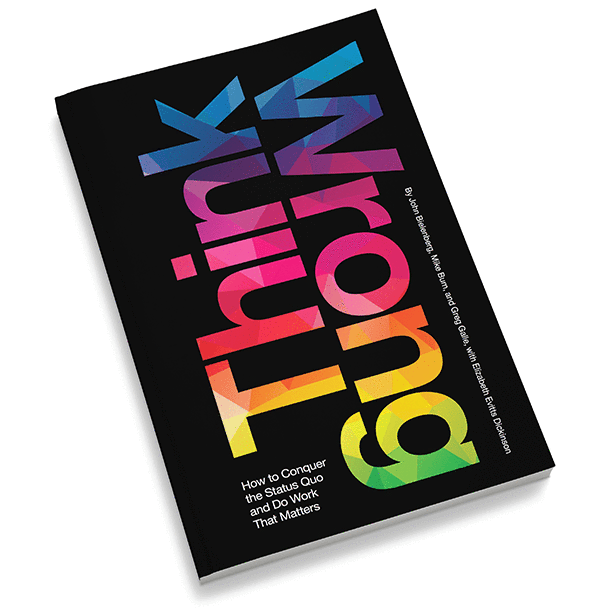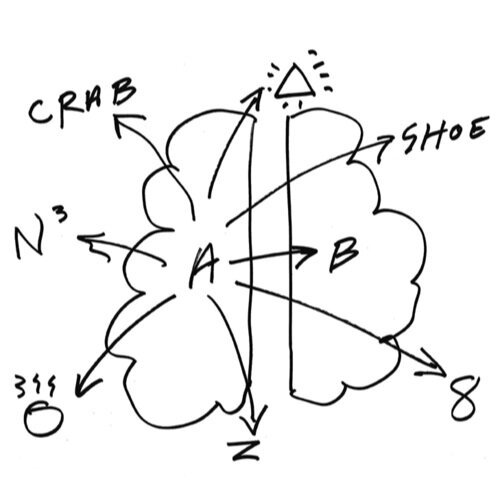Innovation System: Platform
Think Wrong Frameworks, Tools, and Techniques
Radical Problem Solving.
Learn more about thinking wrong and why it matters.
Think Wrong: To conquer biology and culture and
change how things are to how they might be.
Let us teach you or your team to facilitate Think Wrong (imagine next-generation-design-thinking and a whole lot more) for your organization or clients. Be prepared to spot moments of need and have the practical skills and tools to discover new needs and opportunities, generate status-quo busting solutions, and build the strategic alignment, trust, and momentum required to achieve innovation productivity.
Why think wrong.
All of us find ourselves on the predictable path of how things have been, how things are, and how they will be. This status quo is forged by the synaptic connections in our brains and our culture.
Why thinking wrong is hard to do.
Our brains conspire against us.
Order Think Wrong today.
Topseller—over 10,000 copies sold.
Now in its third printing.
“Finally: a self-help book that has recommendations besides writing goals, meditating and keeping a positive attitude. And it’s not just self-help—Think Wrong supplies concrete workshop instructions and suggestions to give you the tools to bring an entire team together…” —Amazon review
*As an Amazon Associate we earn from qualifying purchases.
When thinking wrong is right.
It’s the norm to assert schools, non-profits, government agencies, and so on should adopt business practices. Places of higher learning perpetuate this through the language, frameworks, tools, and techniques they teach. The business obsession with best practices, optimization, ROI, and metrics has become the standard by which we’re told we should measure ourselves and our impact.
When we are certain which problem to tackle, and we know how to solve it, Think Right Practices are useful. They help eliminate waste, improve quality, scale solutions, and increase productivity.
The human brain is amazing. It locks in what we experience and learn on the fly. This learning builds neural pathways that enable us to make quick, shortcut decisions and to take action without thinking or having to relearn simple tasks—the downside is we too often jump to predictable A to B answers.
Innovation System: Process
Next Cycle
Opportunity Portfolios
Innovation Readiness Assessment
Innovation System: Platform
Next Lab
Think Wrong Problem-Solving System
Solve Next Global Partners
But, if you dare to look beyond the status quo, to imagine different outcomes than the one the predictable path leads to. You need to forge a bold path.
But Think Right Practices provide the answer to a very small subset of challenges—those for which we are certain of the problem and know the solution. Thinking right is wrong when we’re seeking solutions beyond the status quo.
When it comes to discovery, innovation, and changing the game, adopting the mindset of a scientist or an artist with a hypothesis is much more likely to yield insights and new possibilities than conventional, think right business practices. To successfully navigate the uncertain and unknown, we need new language, new frameworks, new techniques, and new tools.
You must fight the powerful biological and cultural forces that conspire to force you back onto the predictable path.
Our Think Wrong Practices and Drills empower you to do this. They equip you to break through from business as usual to business transformation.
It’s time to think wrong.
Our culture conspires against us.
If we want to move off pathways that lead to predictable outcomes, if we want to invent “what’s next,” we need to trick our brains. We need to let go of our own and our cultural beliefs, biases, orthodoxies, and assumptions. We need to start solving from a brand-new place.
We need to trick them both.
The complications that arise from how we’re biologically wired are compounded when a collection of brains works this way. Group think becomes group belief. Group belief becomes dominant culture. What’s acceptable, normal, and expected conspires against anything that lies outside of “what is.”
The more you think wrong the easier it becomes.
Think Wrong Practices and the Think Wrong Drills that support them, foster a culture that allows novel and compelling solutions to be born, to thrive.
Innovation System: People
Leaders of Next Intensive
Think Wrong Intensive
Innovation Leadership Coaching
As you become more adept at thinking wrong, it’ll become second nature.










